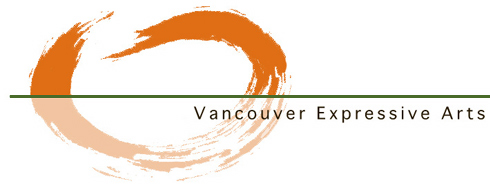

Vancouver Expressive Arts Courses
Expressive Arts Studio
This experiential course offers an in depth exploration of the arts based approach, that is the foundation of expressive arts education and practice. There are six core areas of learning. These core areas are taught as individual intensive courses that emphasize areas of the arts and the movement between modalities. The core experiential courses look at the writings in the field of expressive arts therapy and apply experiential learning to arts based theory in practice and in discussion. The course culminates in individual class presentations of personal experiential research projects.
The six core studio based courses are:
Through the use of both artistic and therapeutic principles, students are encouraged to uncover and explore the questions and events that shape and inform their lives. In this way, experiential studio courses, act as a catalyst for evolving relationships with the arts and with personal understanding of the expressive arts process. The richness of the group environment supports personal and interpersonal learning through the arts. This course work has a direct application in expressive arts practice and in life.
Theoretical Foundation and Research
Human Development
This course explores the developmental stages of childhood and adolescence, using frameworks from various theoretical and cultural models, including the expressive arts approach. It addresses issues of nurturance, therapeutic relationship, assessment and multiculturalism in expressive arts therapy.
Family therapy theory and practice in expressive arts therapy is part of this survey course.
Understanding Human Behaviour: Psychopathology and Salutogenesis
This course introduces frameworks for understanding and evaluating health and illness. Course objectives include the development of an understanding of medical expertise, the development of awareness of Western and non Western models of health and illness and the appreciation of the lived experience of people who suffer within the continuum of “normal “ and “abnormal” behaviour across human beings. The course objectives will be considered and explored in relationship to arts based theory.
Assessment
Examines the criteria, methods and skills that support an expressive arts, resource oriented presentation of client work . Coursework includes the evaluation of medical expertise, the development of professional communication skills, the writing of case notes, and the presentation of evaluative material through a case study.
Professional Ethics and the Expressive Arts Therapist
This course will provide opportunity for the exploration of the nature of the professional relationship and the understanding of the ethics that arise in relationship to the work of the expressive arts practitioner. We will examine a variety of Professional Codes of Ethics and reflect upon examples of personal and professional experience.
Group Expressive Arts Therapy, Community Development and Social Change
This course highlights the role of expressive arts in groups with children, youth, adults, and communities. The course promotes self awareness of our individual interactive style and its impact on various cultural and interest group settings. Students will be introduced to the theory and practice of effective community engagement and effective community development practice, in advocacy, social learning, conflict resolution, group facilitation, strategic planning and collaborative partnership building.
Fieldwork and Practice
Internal Practicum Course and Therapeutic Skills
This course will focus on the overall practice of therapy and therapeutic skills, as well as the components of therapeutic process and the expressive arts context. Students will be actively involved in the learning process and will have the opportunity to role play, with the view toward practicing and exploring the various skills needed in the therapy environment.

© Vancouver Expressive Arts, 2021
Content may not be reproduced without written permission from Heather Dawson.